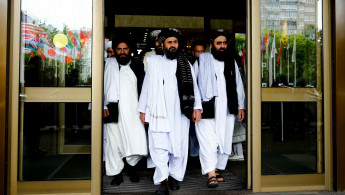US envoy for Taliban talks back in Kabul: official
Washington and the Taliban are still wrangling over a possible deal that would see American troops begin to leave Afghanistan in return for security guarantees.
However, in recent weeks, the US has been largely quiet on the exact status of the talks.
US Special Representative for Afghanistan Reconciliation Zalmay Khalilzad was prepared to hold talks with Afghan President Ashraf Ghani in the afternoon, according to the leader's spokesman.
The details of what they were planning to discuss were unknown.
The US embassy in Kabul did not immediately comment on the envoy's arrival.
Khalilzad's trip to Afghanistan comes a day after the envoy travelled to Pakistan where he met with a host of officials including the country's powerful top general Qamar Javed Bajwa.
Islamabad has helped facilitate the talks between the militants and Washington in Qatar over the past year.
Khalilzad "welcomed Pakistan's ongoing efforts to support a reduction in violence that will pave the way for a US-Taliban agreement, intra-Afghan negotiations, and a comprehensive and permanent ceasefire in support of a sustainable peace", read a statement released by US officials in Pakistan.
The US and Taliban had been negotiating the deal for a year and were on the brink of an announcement in September 2019 when President Donald Trump abruptly declared the process "dead", citing Taliban violence.
 |
Talks were later restarted in December in Qatar, but paused again following an attack near the US-run Bagram military base in Afghanistan |  |
Talks were later restarted in December in Qatar, but paused again following an attack near the US-run Bagram military base in Afghanistan.
Taliban sources told AFP last month they had offered to initiate a brief ceasefire of seven to 10 days to help secure a deal, but there was no announcement of the details of the proposal by either party.
Twitter Post
|
Record levels
As talks have fluctuated, violent attacks in Afghanistan have raged, with the number of clashes jumping to record levels in the last quarter of 2019, according to a US government watchdog report released on Friday.
According to the US Special Inspector General for Afghanistan Reconstruction (SIGAR), "enemy-initiated attacks" rose sharply last year, with the fourth quarter seeing a total of 8,204 attacks - up from 6,974 in the same period in 2018.
September, when the first round of presidential voting was held, saw the highest number of casualty-causing attacks since recording began in 2010.
SIGAR noted that attacks appeared to mirror progress in US-Taliban talks, with incidents dropping earlier in the year, then picking up again after US President Donald Trump temporarily halted negotiations in September.
"A turbulent last six months resulted in increases in overall enemy attacks (6 percent) and effective attacks (4 percent) in 2019 compared to the already high levels reported in 2018," SIGAR said in its quarterly report to the US Congress.
The Pentagon has also continued to up the tempo of operations, with American warplanes dropping more bombs on Afghanistan in 2019 than at any other time in at least a decade, according to the US Air Force.
The Pentagon has also continued to up the tempo of operations, with American warplanes dropping more bombs on Afghanistan in 2019 than at any other time in at least a decade, according to the US Air Force.
The US has for months been calling on the militants to reduce violence, but both sides have said little in recent days about the status of talks and the Kabul government wants the US to push for a full ceasefire.
SIGAR's report also found that Afghanistan's security forces struggled to take the fight to the Taliban, relying on US support for more than half their ground operations.
SIGAR also highlighted a slight increase in the number of casualties among Afghan military members, who have sustained massive losses over the past five years.





 Follow the Middle East's top stories in English at The New Arab on Google News
Follow the Middle East's top stories in English at The New Arab on Google News

![Israeli forces ordered bombed Gaza's Jabalia, ordering residents to leave [Getty]](/sites/default/files/styles/image_330x185/public/2176418030.jpeg?h=a5f2f23a&itok=_YGZaP1z)
